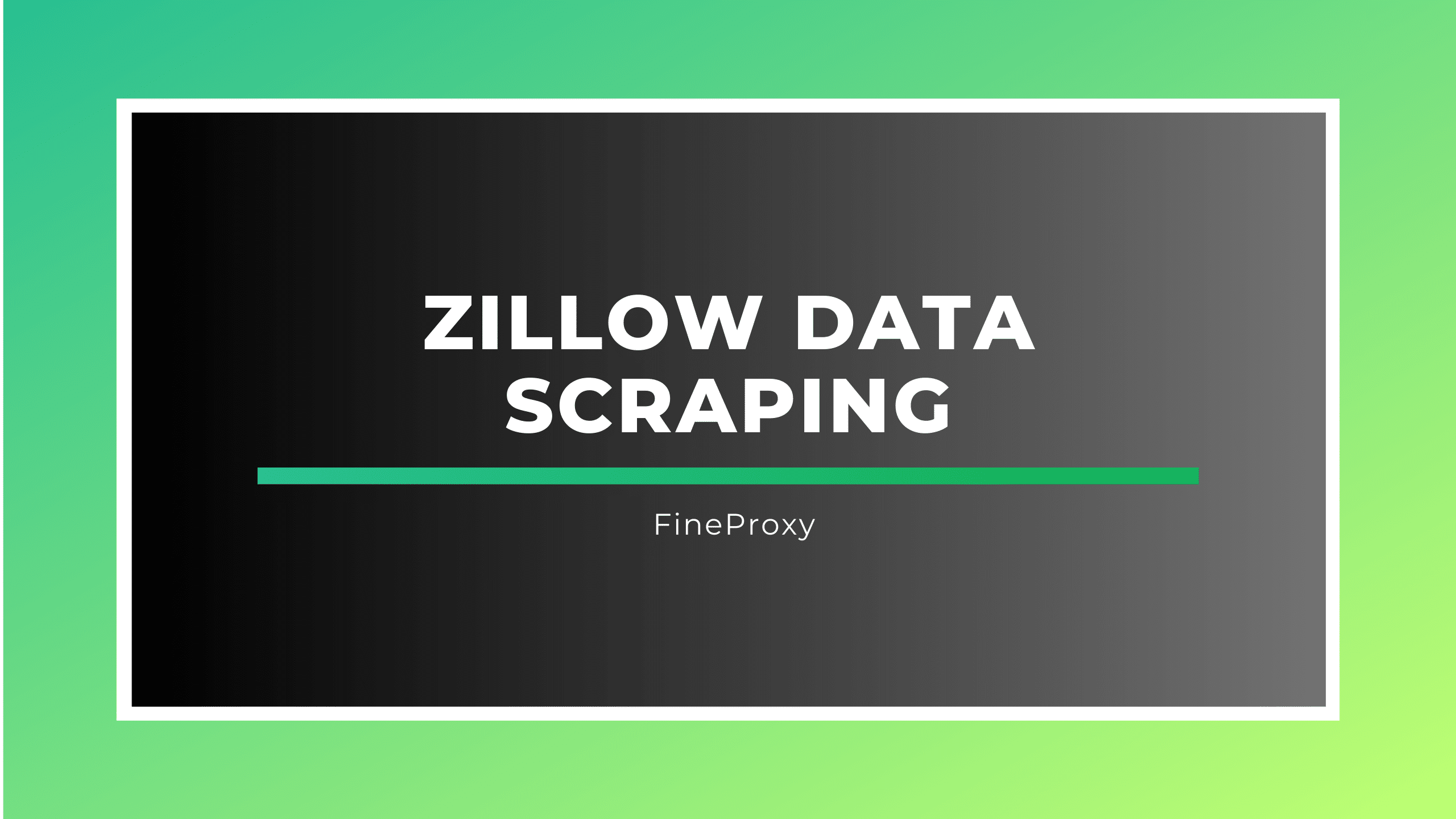
- What are the key legal and ethical considerations when scraping data from Zillow?
- How can Python and its libraries be utilized for efficient web scraping of Zillow’s data?
- What are the practical applications of scraped data from Zillow in real estate market analysis?
- What are some common challenges faced when scraping data from Zillow, and how can they be overcome?
- What are the advantages and limitations of using Zillow’s API for accessing real estate data?

Zillow stands as a titan in the realm of real estate and rental marketplaces in the United States, offering an unparalleled depth and breadth of property-related information. This platform is a goldmine for buyers, sellers, renters, and real estate professionals, providing exhaustive details on property prices, features, locations, and prevailing market trends. The true value of Zillow lies in its massive and constantly updated database, encompassing a wide array of new listings, fluctuating price points, and evolving market dynamics. This extensive repository of real estate data positions Zillow as an indispensable resource for anyone seeking to access up-to-date and comprehensive real estate information.
Importance of Scraping Zillow Data
The act of scraping data from Zillow unlocks a plethora of advantages, particularly for stakeholders in the real estate domain such as investors and industry professionals. Access to Zillow’s rich data can lead to profound insights into market trajectories, pricing strategies, and potential investment avenues. By methodically analyzing the vast array of property listings on Zillow, users can discern market patterns, benchmark property values across diverse locales, and make well-informed decisions rooted in the current market context. Furthermore, web scraping facilitates the efficient and automated extraction of this data, thus economizing on time and resources while amassing a substantial dataset for detailed analysis.
Preparing for Zillow Data Scraping
Venturing into web scraping, especially with a focus on Zillow, necessitates a keen awareness of the legal and ethical landscape. Web scraping, while a potent mechanism for data acquisition, treads a fine line legally. It’s imperative to adhere to the terms of service of the website and ensure that your scraping activities align with legal standards and ethical norms. Zillow, like many digital platforms, stipulates specific guidelines on data usage, and compliance with these guidelines is essential to circumvent legal entanglements. In addition, upholding ethical standards, particularly in terms of user privacy and refraining from harvesting personal data, is a critical aspect of any web scraping project.
Setting Up Your Environment for Scraping

To effectively scrape data from Zillow, a well-structured setup is essential. This setup process involves several key elements:
- Tool Selection: The choice of web scraping tools is pivotal. Opt for tools that are robust and can adeptly navigate the complexities of Zillow’s website architecture. This might include programming languages like Python, complemented by libraries such as Beautiful Soup or Scrapy, renowned for their efficacy in web scraping.
- Website Structure Comprehension: Gaining a deep understanding of Zillow’s website structure is crucial. Comprehending the organization of data, the presentation of search results, and the site’s navigational schema can significantly enhance the efficiency and effectiveness of your scraping scripts.
- Rate Limiting and IP Ban Avoidance: Implementing rate limiting within your scraping scripts is crucial to prevent overloading Zillow’s servers. Excessive scraping requests can trigger an IP ban, underscoring the importance of scraping data at a reasonable pace.
- Data Storage Strategy: Plan your data storage mechanism thoughtfully. Whether opting for databases, CSV files, or JSON formats, ensure that the chosen method is well-organized and scalable to accommodate the volume of data you intend to scrape.
With thorough preparation and a clear understanding of the intricacies involved in scraping data from Zillow, individuals and businesses can effectively harness this rich resource for a multitude of purposes, ranging from in-depth market analysis to the development of comprehensive real estate tools and solutions.
Using APIs for Ethical Scraping
Zillow API
The Zillow API offers a legitimate and efficient means to access a wealth of real estate data directly from Zillow. Users leveraging the Zillow API can obtain detailed information, such as property listings, Zestimate values, and intricate property specifics. This API is particularly useful for individuals and businesses aiming to ethically integrate Zillow data into their applications or websites. It’s important to note that accessing data through the Zillow API is subject to certain limitations and requires adherence to Zillow’s specified terms and conditions.
Other Compatible APIs
Beyond Zillow’s proprietary API, there are numerous third-party APIs available that can access real estate data, including information from Zillow. These APIs typically aggregate data from multiple sources, presenting it in an organized and accessible format. They are especially useful for users who require more comprehensive data than what is offered by Zillow’s API or those who need an amalgamation of data from various real estate platforms.
Manual Scraping Techniques
Inspecting Web Page Elements
Manual scraping of Zillow’s website involves a detailed inspection of web page elements. This process requires utilizing browser developer tools to understand the website’s HTML structure, thereby identifying the CSS selectors or XPath for relevant data points. This approach, while meticulous and requiring a basic understanding of HTML and web structure, is particularly valuable for small-scale data scraping projects.
Identifying Key Data Points
Key data points on Zillow typically encompass elements like property prices, addresses, listing details, and agent information. Manually extracting this data involves pinpointing the specific HTML elements that contain these details. While this method can be labor-intensive and time-consuming, it remains a viable option for targeted data extraction tasks.
Automated Scraping Tools
Using Python Libraries (Beautiful Soup, Requests, etc.)
Python, with its powerful libraries such as Beautiful Soup and Requests, is a widely favored tool for automated web scraping. Beautiful Soup facilitates the efficient parsing of HTML and XML documents, enabling seamless navigation and extraction of required data. When used in conjunction with Requests, which manages HTTP requests, Python becomes an immensely effective tool for scraping and processing data from Zillow.
Third-Party Scraping Services
For individuals lacking programming skills or needing more sophisticated scraping capabilities, third-party scraping services provide an accessible alternative. These services handle the complexities of web scraping and deliver the extracted data in a structured format, offering a straightforward and efficient solution for acquiring data from Zillow.
Overcoming Challenges in Scraping Zillow
Handling Dynamic Web Layouts
Zillow’s website is characterized by its dynamic layouts, which can change periodically. Effective scraping of such a site demands tools or methodologies that can adapt to these evolving layouts. This often involves creating advanced scraping scripts capable of managing AJAX calls and dynamically loaded content.
Bypassing Anti-Scraping Measures
Zillow implements several anti-scraping mechanisms, such as CAPTCHA, IP rate limiting, and JavaScript challenges, to prevent automated extraction of its data. Navigating these barriers requires advanced techniques, including the use of rotating proxy servers, CAPTCHA-solving services, and the deployment of headless browsers capable of executing JavaScript.
Ensuring Data Quality and Relevance
Upholding the quality and relevance of the scraped data is essential. This entails routinely updating and validating scraping scripts to stay aligned with updates on Zillow’s website. Additionally, it involves implementing verification checks within the scraping process to ensure the accuracy and completeness of the collected data.
In summary, acquiring data from Zillow can be achieved through various methods, ranging from API usage to manual and automated scraping techniques. Each approach presents its unique set of challenges, particularly in dealing with the dynamic nature of the website and its anti-scraping measures. By selecting the most suitable method and tools, while adhering to legal and ethical standards, one can effectively extract and utilize the extensive real estate data offered by Zillow for diverse analytical and business applications.
Practical Applications of Scraped Zillow Data
Real Estate Market Analysis
Scraped Zillow data is a goldmine for real estate market analysis. By leveraging the extensive data available on Zillow, analysts can examine housing trends, track market fluctuations, and identify emerging hotspots. This analysis can include studying average property prices, time on market, and changes in supply and demand in different regions. For instance, analyzing price trends over time in a specific area can reveal market cycles, helping investors and realtors make informed decisions.
Investment and Pricing Strategies
Investors and property managers can use scraped Zillow data to formulate robust investment and pricing strategies. By analyzing property values, rental rates, and neighborhood demographics, they can identify lucrative investment opportunities and set competitive prices. For example, scraped data can help investors find undervalued properties in up-and-coming neighborhoods or determine the optimal rental price for their properties based on current market rates.
Competitive Analysis in Real Estate
In the highly competitive real estate industry, scraped data from Zillow can provide valuable insights into competitors’ strategies. Realtors and firms can study listing details, agent success rates, and marketing strategies. This information can be used to benchmark against competitors, refine marketing approaches, and improve service offerings.
Step-by-Step Guides
Detailed Instructions and Code Samples:
- Choose a Scraping Tool: Select a tool like Python with Beautiful Soup and Requests libraries.
- Inspect Zillow’s Page: Use your browser’s developer tools to inspect the structure of the real estate listings page on Zillow. Identify the HTML elements that contain the listing data.
- Write the Code:
import requests from bs4 import BeautifulSoup url = 'https://www.zillow.com/homes/for_sale/' response = requests.get(url) soup = BeautifulSoup(response.content, 'html.parser') listings = soup.find_all('div', class_='list-card-info') for listing in listings: price = listing.find('div', class_='list-card-price').text address = listing.find('address').text print(f'Price: {price}, Address: {address}')
This script fetches the HTML content from the Zillow listings page, parses it, and extracts the price and address for each listing.
Extracting Individual Property Details
Detailed Instructions and Code Samples:
- Setup: Use Python and libraries like Beautiful Soup.
- Inspect the Property Page: Look at the individual property page on Zillow and identify key data points such as price, size, and features.
- Sample Code:
import requests from bs4 import BeautifulSoup url = 'https://www.zillow.com/homedetails/example-property/' response = requests.get(url) soup = BeautifulSoup(response.content, 'html.parser') price = soup.find('span', class_='ds-value').text size = soup.find('span', class_='ds-bed-bath-living-area').text features = soup.find('ul', class_='ds-home-fact-list').text print(f'Price: {price}, Size: {size}, Features: {features}')
This script captures details from a specific property listing, extracting information like price, size, and additional features.
Scraping Real Estate Agent Data
Detailed Instructions and Code Samples:
- Tool Selection: Again, Python with Beautiful Soup is an excellent choice.
- Page Analysis: Analyze the Zillow agent listing page to identify where agent information is stored.
- Example Code:
import requests from bs4 import BeautifulSoup url = 'https://www.zillow.com/agent-finder/real-estate-agent-reviews/' response = requests.get(url) soup = BeautifulSoup(response.content, 'html.parser') agents = soup.find_all('div', class_='agent-list-card') for agent in agents: name = agent.find('h3').text contact_info = agent.find('p', class_='contact-info').text print(f'Agent Name: {name}, Contact Info: {contact_info}')
This script is designed to extract basic information about real estate agents, such as names and contact details, from Zillow’s agent finder page.
In conclusion, scraped Zillow data offers a wealth of opportunities for real estate market analysis, investment strategy formulation, and competitive analysis. By following these step-by-step guides, individuals and organizations can extract valuable data from Zillow, paving the way for informed decision-making in the real estate sector.
Storing and Utilizing Scraped Data
Data Storage Solutions (CSV, JSON, Databases)
Once you have scraped data from Zillow, it’s crucial to store it in a format that facilitates easy access and manipulation. Common formats include CSV (Comma-Separated Values), JSON (JavaScript Object Notation), and databases.
- CSV Files: Ideal for storing tabular data. CSV files are straightforward to create, read, and process, and they are compatible with most data analysis tools and spreadsheet applications like Microsoft Excel.
- JSON Format: Best suited for hierarchical or nested data, JSON files are easily readable and can be directly used in web applications. They are particularly useful when the scraped data involves multiple levels of details, like property listings with nested features.
- Databases: For handling large volumes of data or for long-term projects, storing data in databases (such as MySQL, PostgreSQL, or MongoDB) is more efficient. Databases allow for better data management, querying, and scalability.
Analyzing and Interpreting the Data
The real power of scraped data lies in its analysis and interpretation. Data from Zillow can be used to gain insights into market trends, pricing strategies, and consumer preferences. Tools like Python’s Pandas library, R, or even Excel can be used for this purpose. Data visualization tools such as Tableau or PowerBI can help in presenting the data in an easily interpretable format.
Advanced Techniques and Tips
Leveraging Python and Other Programming Languages
Python is a popular choice for web scraping due to its simplicity and the powerful libraries available for data extraction, such as Beautiful Soup, Scrapy, and Selenium. Other programming languages like JavaScript (Node.js) and Java can also be used, depending on the complexity of the task and the user’s proficiency.
Optimizing Scraping Efficiency
Efficient web scraping involves minimizing the load on the server and speeding up the data collection process. Techniques like setting appropriate time delays between requests, scraping during off-peak hours, and using asynchronous requests can optimize efficiency.
Avoiding Common Pitfalls
Common pitfalls in web scraping include not respecting robots.txt files, hitting rate limits, and scraping irrelevant data. It’s important to be mindful of a website’s scraping policy, to distribute requests over time, and to ensure that the scraping scripts are well-targeted to gather only relevant data.

FAQ
What is web scraping in the context of Zillow?
Web scraping Zillow involves the automated process of extracting a wide range of real estate data from the Zillow website. This process typically includes gathering detailed information such as property listings, pricing, features, agent details, and market trends, which are publicly displayed on Zillow’s web pages.
Is it legal to scrape data from Zillow?
The legality of scraping data from Zillow can be complex and varies based on how the data is used and whether it complies with Zillow’s terms of service. To ensure legal compliance, it is strongly recommended to seek legal advice and strictly adhere to the guidelines and policies set by Zillow for data scraping.
What types of data can be scraped from Zillow?
Data that can be scraped from Zillow encompasses a diverse array of information, including property prices, geographical locations, detailed property descriptions, information about real estate agents, and comprehensive market analytics. The specific data you can extract largely depends on the methods and tools used for scraping and the particular elements targeted on Zillow’s web pages.
Do I need programming skills to scrape data from Zillow?
While programming skills, especially in languages like Python or JavaScript, greatly facilitate web scraping, there are also various tools and platforms available that enable those without programming expertise to scrape data from sites like Zillow. These tools often provide user-friendly interfaces for data extraction.
How can I use scraped Zillow data?
Scraped data from Zillow can be utilized for several purposes, including conducting in-depth real estate market analysis, developing strategic investment plans, performing competitive analysis in the real estate sector, academic research, and for personal assessments in real estate ventures.
What tools are commonly used for scraping data from Zillow?
Common tools for scraping data from Zillow include Python libraries like Beautiful Soup and Scrapy, which are popular among programmers. Additionally, web scraping platforms such as Octoparse offer a more accessible approach. APIs that grant access to Zillow’s data are also widely used for this purpose.
Can scraping Zillow lead to any legal issues?
Scraping Zillow without complying with its terms of service or relevant legal regulations, such as GDPR, can potentially lead to legal complications. Therefore, it is crucial to approach data scraping in a responsible and ethical manner, ensuring adherence to all applicable laws and guidelines.
How do I store scraped data from Zillow?
Data scraped from Zillow can be stored in various formats depending on your needs and the scale of the data. Common storage formats include CSV files for tabular data, JSON for structured data, or in databases for larger and more complex data sets.
Are there any challenges in scraping Zillow data?
Scraping data from Zillow presents several challenges, including navigating through anti-scraping mechanisms such as CAPTCHAs and dynamically loaded content. Another significant challenge is ensuring the accuracy and relevance of the scraped data, which requires regular updates and validation of scraping methods.
Can web scraping Zillow replace traditional real estate market research?
While web scraping Zillow offers valuable quantitative insights, it should be viewed as a complement to traditional real estate market research methods, rather than a replacement. Traditional research often provides qualitative insights that might not be captured through web scraping alone, hence a combined approach yields the most comprehensive understanding of the market.






Comments (0)
There are no comments here yet, you can be the first!